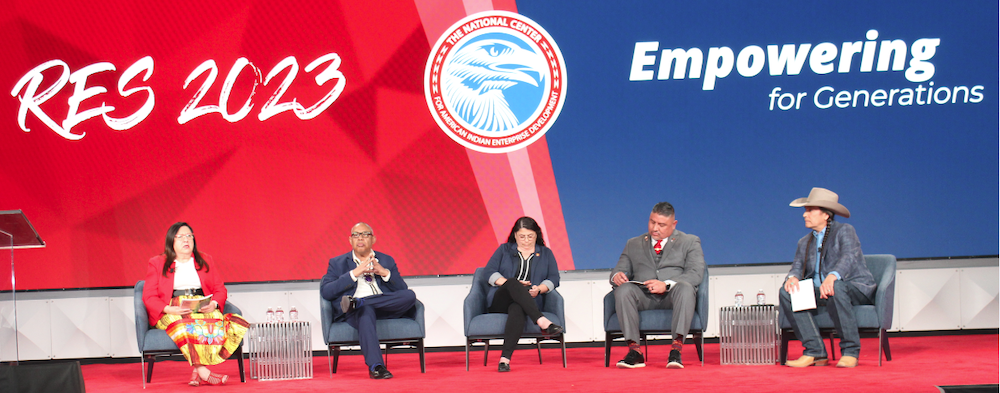
- Details
- By Elyse Wild
- Economic Development
LAS VEGAS — A record-breaking crowd descended on Caesar's Palace in Las Vegas last week to talk about doing business in Indian Country at the 2023 Reservation Economic Summit (RES).
This year’s event drew more than 4,000 attendees, making it “the largest RES in history,” according to Chris James, CEO of the National Center for American Indian Enterprise Development, which produces the annual summit.
“The strength and diversity of our economy, culture, and community was on display for the entire four days of our annual conference,” James said.
This year’s sizable crowd may also reflect the historic amounts of capital that have flowed into Indian Country, as well as what’s on the horizon for Native American tribes — from the 2023 Farm Bill and looming changes at the Treasury Department’s CDFI Fund, to new opportunities in clean energy and growing interest in the cannabis market.
This year’s RES highlighted the theme of empowerment during the five-day event. After Sunday’s welcome events, the next four days included a general session in the hotel and casino’s expansive Augustus Ballroom and 50-minute breakout sessions in the adjacent ballrooms covering topics from food sovereignty, voting rights, access to capital, infrastructure, entrepreneurship and more.
Stand-out talks from Monday’s general session included a women’s leadership panel called “Empowering for Generations” that featured a former Obama-era commissioner for the Administration for Native Americans in the U.S. Department of Health and Human Services, Lillian Sparks Robinson; and S.R. Tommie, founder and president of award-winning advertising agency Redline Media Group.
Tommie, an enrolled member of the Seminole Tribe of Florida, spoke of her own 20-year journey of growing Redline Media into a globally recognized company with 50 employees serving clients in 76 countries around the world. As well, she spoke of finding success by standing firmly on the foundation of love and support built by Native women in Indigenous communities.
“Women in our communities are the ride or die,” Tommie said to the attentive audience of thousands. “We cannot succeed without them.”
Following was a keynote speech by James Anderson, an enrolled member of the Lac Courte Oreilles Ojibwe and owner of Old Southern BBQ restaurants located in Minnesota and Wisconsin. Anderson’s restaurants have been lauded in the top 20 BBQ restaurants in the country, and his training company, LifeSkills, has been featured on the Oprah Winfrey Show. Anderson brought his signature high energy to the keynote as he spoke to the crowd about what empowerment looks like in action.
“Empowerment takes time and energy that you must give to your people,” Anderson said. “But before you empower your people, you must have trust. Your people have to know that you say what you mean, and you mean what you say. And you have to respect them and listen to them, or else you cannot empower your people or employees.”
After Monday’s general session concluded, the crowd dispersed to attend breakout panels covering a variety of topics such as Next Generation Leadership, The Farm Bill, the Power of Personal Branding, and more. This reporter attended the Creating NextGen Trailblazers, led by moderator William Lowe, CEO of Will Lowe Consulting, and featuring panelist branding strategist Michele Meza and tech solutions provider North Stone LLC CEO Calista Pinnecoose.
Pinnecoose and Meza emphasized the importance of bringing the intrinsic Native value of knowledge sharing into the workforce to spur tribal economic development as younger generations ascend to leadership roles. That will be especially important with the rise of Gen-Z individuals, who are part of the largest generation since the Baby Boomers.
As an example, Pinnecoose shared a moving personal anecdote: On the first day of a high school internship, she was asked to make coffee using an electric coffee maker. Growing up on the Navajo Nation without electricity, she said, she had never used an electric coffee maker and instead brewed coffee over a fire in a camping kettle.
“They had to teach me how to use the electric coffee maker,” she said. “The reason I share this is to demonstrate that not everyone knows what you know. It’s important to be open-minded and teach others what you know. We, all of us in this room, will be ancestors one day.”
Sessions throughout the day hit on the same theme of knowledge sharing through mentorship, tribal voting initiatives, navigating 8(a) contracts, growing tribal enterprises into global brands, and more.
Tuesday morning kicked off opening remarks from tribal business leaders from the Diné Development Corporation and San Pasqual Economic Development Corporation, as well as from U.S. Representative Teresa Leger Fernández (D-N.M.) and The Honorable Polly Trottenberg from the U.S. Department of Transportation.
NCAID President and CEO Chris James delivered the morning’s keynote speech, sharing experiences from his childhood as a young student with a learning disability. As a child, James was, as he put it, “written off.” He paralleled his personal journey of rising above the expectations set for him to that of an Indian Country thriving under historic disinvestment.
Tuesday evening brought RES attendees poolside to Ceasar’s Palace Temple Pool for the “40 Under 40 Awards.” The event featured exclusive appetizers by James Beard Award-winning chef Sean Sherman, also known as “The Sioux Chef,” and recognized Indigenous leaders under age 40 making a difference in Indian Country. Among those honored were supermodel and activist Quannah Chasinghorse (Hän Gwich’in and Sicangu-Oglala Lakota), Indigenous Amazon program manager Caleb Dunlap (Fond du Lac Band of Lake Superior Chippewa), and tribal cannabis consultant Jeremy Wilson (Eastern Band of Cherokee Indians).
Wednesday morning’s general session featured a panel that addressed one of Indian County’s quickly emerging industries: tribal hemp and cannabis. The panel, composed of leaders from the Indigenous Cannabis Industry Association — which is notably based in Wisconsin, where cannabis remains illegal — spoke of the difficulties and immense potential of tribal cannabis operations.
“The complexities are enormous,” said ICIA’s legal council and panelist Samantha Skenendore. “And that is the cost of sovereignty.”
